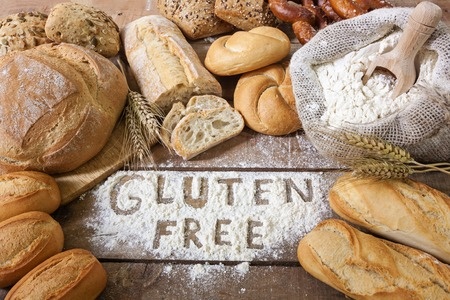Gluten-free diets have been touted as a reliable weight loss technique. But do they really work?
In my opinion, weight loss is not about eliminating gluten from your diet. Nonetheless, I’ve heard many personal trainers at my gym advise their clients who are struggling with weight loss to go gluten-free. They give this advice without even asking their clients if they have a gluten sensitivity or allergy.
Gluten-Free Food Diets Don’t Promote Weight Loss
Gluten-free diets are the latest craze for those looking to lose weight, but what’s the truth? Is gluten responsible for my love handles? The answer is no, but let’s clear the air of any confusion.
What Is Gluten and Celiac Disease?
Gluten is a protein found in wheat, rye, barley and countless processed foods including pasta, breads and cereals.
Some people avoid gluten because they have Celiac disease. Celiac disease is an auto-immune disorder. The body’s immune response to gluten damages the small intestine lining. This results in abdominal pain, bloating, nausea and diarrhea. Celiac disease prevents absorption of vitamins and minerals and promotes weight loss.
Other people avoid gluten because of gluten intolerance. Gluten intolerance mimics symptoms of Celiac disease without the immune response.
Why Do People Avoid Gluten To Lose Weight?
There’s absolutely no evidence that simply getting rid of gluten will result in weight loss.
However, eating gluten-free often may cause you to eat more whole, unprocessed foods such as fruits, vegetables, legumes and lean meats. These diet changes are often healthier and lower in calories.
People eating gluten-free also tend to make healthier food choices because they are more aware of the need to read food labels.
Ditching the double cheeseburger and fries for a gluten-free meal of salad, chicken breast, and sweet potato is choosing a meal that is much lower in calories. That can mean weight loss over time.
Aren’t All Gluten-Free Foods Healthy?
Gluten-free does not necessarily mean healthy because all gluten-free foods are not equally nutritious.
An apple and a gluten-free sugar cookie are both gluten-free, but their nutrients vary drastically.
Grocery and health food stores are full of gluten-free cakes, cookies and sweet treats. These foods often are high in sugar and fat, making them dense with calories. Be sure to read those food labels!
I Don’t Have Celiac Disease Or Gluten Intolerance. Is It Safe To Avoid Gluten?
Absolutely! Some people choose to follow a gluten-free diet merely because it provides structure to eating healthier and adopting a healthy lifestyle.
Just remember to consume a varied diet rich in fruits, vegetables, and legumes to avoid vitamin/mineral deficiencies and promote a healthy weight and lifestyle.
Gluten-Free Diets: The Bottom Line
Gluten-free diets are typically consumed by those who are unable to tolerate gluten on a biological level. However, some people choose to follow a gluten-free diet for more healthful eating.
There is no harm in avoiding gluten, but remember to consume a balanced diet rich in fruits, vegetables and legumes. Make sure your gluten-free choices are still 100 percent whole grain, such as buckwheat, quinoa or brown rice.
You lose weight when you expend more calories or energy than you consume – not by avoiding gluten. Diet and exercise are both important components of weight management and a healthy lifestyle.
Click here to read full story about why gluten-free diets are not an effective weight loss tool.






